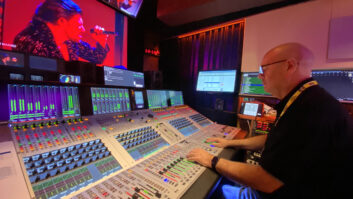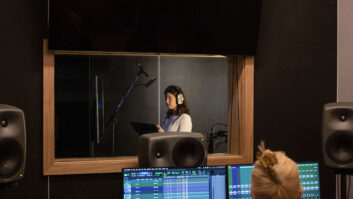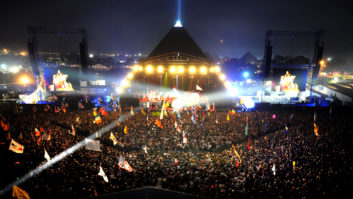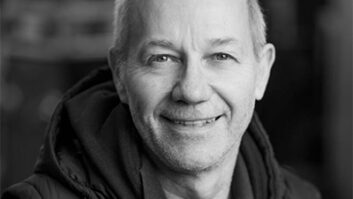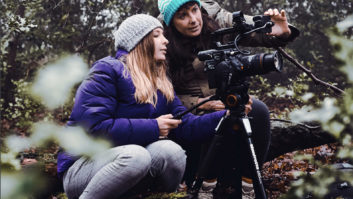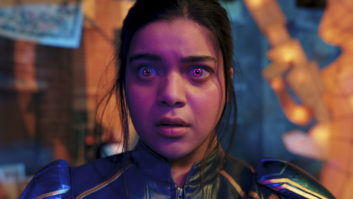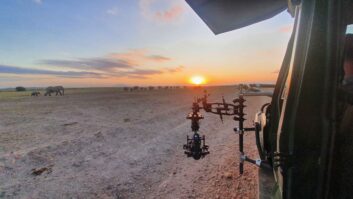
There’s no question The Great British Bake Off is now a key part of the British broadcast year. Those worried by the show’s move from the BBC to Channel 4 have found the its ingredients stayed pretty much the same, instead of a Victoria Sponge, Channel 4 served up a fruit cake – the same basic mix with Noel Fielding added in for a bit of flavour. Despite Prue Leith’s Twitter blunder, fans switched on in their millions to find out who would be crowned this year’s winner.
Of course, one of the key ingredients to any show’s success is how it sounds. And with a show like Bake Off, recording the audio isn’t a piece of cake, as sound supervisor Richard Meredith tells TVBEurope, “There are several challenges in terms of sound and baking,” he explains. “There’s the noise of the other bakers, and because it’s a timed challenge you can’t stop them blending or whisking.”
“The bakers always end up mixing dough at the same time, right at the start when the producers are trying to get their initial thoughts on the challenge. So most often the start of a bake is one of the hardest times for us to collect the audio.”
“We’ve got several rules that we try to follow,” explains Meredith. “We try to leave two adjacent benches distance so there’s some isolation between one baker’s voice or mixer bleeding across onto the radio mic of another baker. Also, when they do the presenter and judge visits, we endeavour to have a limit on how high they can have their mixer. We don’t stop them, we just try and control the speed of the mixer a little bit.”
Bake Off uses radio mics for all the bakers, judges and presenters. “We can’t boom anything because there’s a big wide shot on a jib and we’d constantly be in that shot,” explains Meredith. “There’s always a wide shot at the back just filming nice shots of the bakers going about their business. If we boomed we would be constantly in it.”
Meredith oversees a team of four sound recordists working in the main area of the tent, while the sound supervisor is monitoring the audio feeds in the gallery.
“The sound supervisor sits in the gallery with the director – when I say gallery, it is in part of the tent,” he explains. “The sound supervisor is monitoring all the audio feeds from the radio mics. We record an isolated audio feed there in the gallery which ensures all the radio mics are kept separate so that when the producers get back to post production they can pick and choose what they want to hear at any point to match whatever a camera happens to be doing.
“The floor recordists effectively derive a local ‘scratch mix’ which is a rough mix, so if somebody wants to review camera shots later for logging purposes, before it goes fully into post production, they have got a reference audio they can hear. If you’re logging and you can see people but you can’t hear then it makes it very difficult. So the floor recordists generate an audio scratch mix while we’re in the tent and this mix is available if there are any floor producers who need to listen in to conversations too.”
Another of the big challenges of working on a show like Bake Off is the sheer amount of footage that’s filmed in the tent. Some challenges can last up to five hours, meaning the production team need all the cameras and mics to be synced to the exact time. In order to ensure all the kit is all operating correctly, the Bake Off team use UltraSync One from Timecode Systems.
“There are two elements of syncing cameras and audio together. One is Timecode and the other is Genlock,” explains Meredith.
“Timecode is just a counting number, you’re squirting into the camera and the sound recorders. So at that point the cameras and sound recorders still bear no relation to each other. They’re just several devices around the set getting a feed of time code. So by giving cameras a synchronisation pulse in addition to the timecode actually ensures a high level of accuracy.
“The UltraSync One is the smallest and most economical product on the market at the moment that can provide both Timecode and Genlock wirelessly, which is essential in an environment like the Bake Off tent.”
There’s one more element that can lead to the show’s sound falling flat: the great British weather. In almost every series, there’s bound to be one filming weekend when the heavens open.
But the Bake Off team even have that under control. “People say ‘how on earth do you film when it’s raining?’ Well the Bake Off tent has its conical peaks on it, which have become synonymous as a visual feature of that tent, they’re not there by accident,” says Meredith.
“That was part of the tent design, because when it rains, the rain falls on those cones and runs off. If you had a normal pitched tent roof, you would have all the rain hitting the ceiling of the tent only a few feet above the bakers. Those cones do help us with rain noise.”

